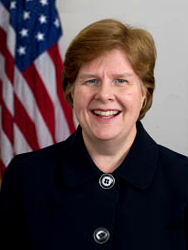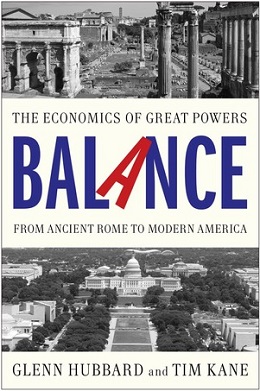
Andrew Michael Spence is a Canadian-American economist and Nobel laureate.

The Hoover Institution is an American public policy think tank which promotes personal and economic liberty, free enterprise, and limited government. While the institution is formally a unit of Stanford University, it maintains an independent board of overseers and relies on its own income and donations. It is widely described as conservative, although its directors have contested the idea that it is partisan.

Trickle-down economics refers to economic policies that disproportionately favor the upper tier of the economic spectrum, comprising wealthy individuals and large corporations. The policies are based on the idea that spending by this group will "trickle down" to those less fortunate in the form of stronger economic growth. The term has been used broadly by critics of supply-side economics to refer to taxing and spending policies by governments that, intentionally or not, result in widening income inequality; it has also been used in critical references to neoliberalism. However, the term does not represent any cohesive economic theory.

Robert Glenn Hubbard is an American economist and academic. He served as the Dean of the Columbia University Graduate School of Business from 2004 to 2019, where he remains the Russell L. Carson Professor of Finance and Economics. On September 13, 2018, he announced that he would retire from his position after his contract expired on June 30, 2019. Hubbard previously served as Deputy Assistant Secretary at the U.S. Department of the Treasury from 1991 to 1993, and as Chairman of the Council of Economic Advisers from 2001 to 2003.

Robert Patrick Murphy is an American economist. Murphy is research assistant professor with the Free Market Institute at Texas Tech University. He has been affiliated with Laffer Associates, the Pacific Research Institute, the Institute for Energy Research (IER), the Independent Institute, the Ludwig von Mises Institute, and the Fraser Institute.

Edward Paul Lazear was an American economist, the Morris Arnold and Nona Jean Cox Senior Fellow at the Hoover Institution at Stanford University and the Davies Family Professor of Economics at Stanford Graduate School of Business.

Drue Kataoka is a Japanese American visual artist and political commentator. She is known for her Sumi-e art and interest in technology. In 2012, Kataoka was chosen as the Young Global Leader for the World Economic Forum summit at Davos. She is based in Silicon Valley, California.
Brian S. Wesbury is an American economist focusing on macroeconomics and economic forecasting. He is the economics editor and a monthly contributor for The American Spectator, in addition to appearing on television stations such as CNBC, Fox Business, Fox News, and Bloomberg TV frequently. He is a member of the Academic Advisory Council of the Federal Reserve Bank of Chicago, and for five years served as an adjunct professor of economics at Wheaton College in Wheaton, Illinois.
George Jesus Borjas is a Cuban-American economist and the Robert W. Scrivner Professor of Economics and Social Policy at the Harvard Kennedy School. He has been described as "America’s leading immigration economist" and "the leading sceptic of immigration among economists". Borjas has published a number of studies that conclude that low-skilled immigration adversely affects low-skilled natives, a proposition that is debated among economists.

Christina Duckworth Romer is the Class of 1957 Garff B. Wilson Professor of Economics at the University of California, Berkeley and a former chair of the Council of Economic Advisers in the Obama administration. She resigned from her role on the Council of Economic Advisers on September 3, 2010.

Jared Bernstein is an American musician who is the chair of the United States Council of Economic Advisers. He is a senior fellow at the Center on Budget and Policy Priorities. From 2009 to 2011, Bernstein was the chief economist and economic adviser to Vice President Joe Biden in the Obama Administration. In 2008, Michael D. Shear described Bernstein as a progressive and "a strong advocate for workers".

Carl J. Schramm is an American economist, entrepreneur, author, former President of the Ewing Marion Kauffman Foundation, and University Professor at Syracuse University. He is the author of the book Burn the Business Plan: What Great Entrepreneurs Really Do, published by Simon & Schuster. The Economist named Schramm the "evangelist of entrepreneurship".

Following the global 2007–2008 financial crisis, there was a worldwide resurgence of interest in Keynesian economics among prominent economists and policy makers. This included discussions and implementation of economic policies in accordance with the recommendations made by John Maynard Keynes in response to the Great Depression of the 1930s, most especially fiscal stimulus and expansionary monetary policy.

The Nobel Memorial Prize in Economic Sciences, officially the Sveriges Riksbank Prize in Economic Sciences in Memory of Alfred Nobel, is an economics award funded by Sveriges Riksbank and administered by the Nobel Foundation.
Ann Lee is a Hong Kong-born American author and commentator on global economics and finance issues.
Expeditionary economics is an emerging field of economic enquiry that focuses on the rebuilding and reconstructing of economies in post-conflict nations and providing support to disaster-struck nations.
Anat Ruth Admati is an economist and currently the George G.C. Parker Professor of Finance and Economics at Stanford Graduate School of Business. In 2014, Time listed her as one of the 100 Most Influential People in the World.

Balance: The Economics of Great Powers from Ancient Rome to Modern America, known colloquially as Balance is a non-fiction economic history text written by former US intelligence officer and economist Captain Tim Kane and economist Glenn Hubbard. While criticized for its brevity across a wide range of historical matters, it has become an often cited text in the debate around American Isolationism and fiscal policy.














